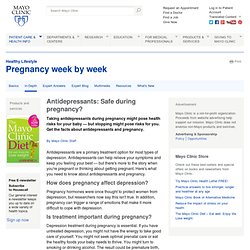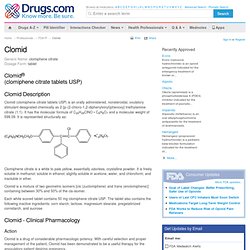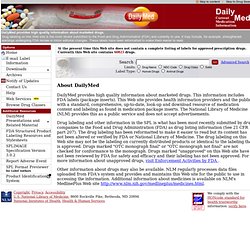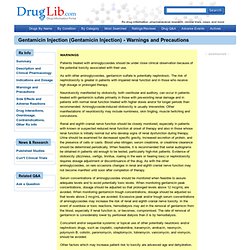

Antidepressants: Safe during pregnancy? Antidepressants: Safe during pregnancy?

Taking antidepressants during pregnancy might pose health risks for your baby — but stopping might pose risks for you. Get the facts about antidepressants and pregnancy. By Mayo Clinic Staff Antidepressants are a primary treatment option for most types of depression. Antidepressants can help relieve your symptoms and keep you feeling your best — but there's more to the story when you're pregnant or thinking about getting pregnant.
How does pregnancy affect depression? Pregnancy hormones were once thought to protect women from depression, but researchers now say this isn't true. Is treatment important during pregnancy? Depression treatment during pregnancy is essential. Are antidepressants an option during pregnancy? A decision to use antidepressants during pregnancy is based on the balance between risks and benefits. Generic Antidepressants - Depression. You knew this was coming next, didn't you?

Generic antidepressants are beginning to appear en masse, as the patents on the innovator drugs expire. Generic Prozac has been available since 2001, generic Paxil since 2005, and generic Zoloft since 2006. Joining them will be generic versions of Wellbutrin XL, Paxil CR, Lexapro, and Celexa. Manufacturers have been working on the innovator drugs to increase their attractiveness and give them an edge up on the generics. If they can change the drug enough to keep the patent, it's well worth the additional time and money investment. How does an extended-release formula help? These new formulas increase the amount of time it takes for the medication to dissolve. Generic drugs can save you a considerable amount of money. Even if the packaging and labeling seem identical to what you'd find in the United States, the FDA cannot attest to the cleanliness or safety of purchases made outside the United States, as its jurisdiction stops at the borders.
Clomid Official FDA information, side effects and uses. Clinical Trial Adverse Events Clomid, at recommended dosages, is generally well tolerated.

Adverse reactions usually have been mild and transient and most have disappeared promptly after treatment has been discontinued. Adverse experiences reported in patients treated with clomiphene citrate during clinical studies are shown in Table 2. The following adverse events have been reported in fewer than 1% of patients in clinical trials: Acute abdomen, appetite increase, constipation, dermatitis or rash, depression, diarrhea, dizziness, fatigue, hair loss/dry hair, increased urinary frequency/volume, insomnia, light-headedness, nervous tension, vaginal dryness, vertigo, weight gain/loss. Patients on prolonged Clomid therapy may show elevated serum levels of desmosterol. Organization of Teratology Information Specialists.
DailyMed. DailyMed provides high quality information about marketed drugs.

Drug labeling on this Web site is the most recent submitted to the Food and Drug Administration (FDA) and currently in use; it may include, for example, strengthened warnings undergoing FDA review or minor editorial changes. These labels have been reformatted to make them easier to read. About DailyMed DailyMed provides high quality information about marketed drugs. This information includes FDA labels (package inserts). Drug labeling and other information in the SPL is what has been most recently submitted by drug companies to the Food and Drug Administration (FDA) as drug listing information (See 21 CFR part 207). Other information about drugs may also be available. Teratology Society. Teratology and Drug Use During Pregnancy. U S Food and Drug Administration Home Page.
Gentamicin Injection - Warnings and Precautions. (See WARNINGS box on first page).

Aminoglycosides can cause fetal harm when administered to a pregnant woman. Aminoglycoside antibiotics cross the placenta, and there have been several reports of total irreversible bilateral congenital deafness in children whose mothers received streptomycin during pregnancy. Animal reproduction studies conducted on rats and rabbits did not reveal evidence of impaired fertility or harm to the fetus due to gentamicin sulfate. It is also not known whether gentamicin sulfate can cause fetal harm when administered to a pregnant woman or can affect reproduction capacity. Serious side effects to mother, fetus, or newborn have not been reported in the treatment of pregnant women with other aminoglycosides. Do not use additives or premix with other drugs. Neurotoxic and nephrotoxic antibiotics may be almost completely absorbed from body surfaces (except the urinary bladder) after local irrigation and after topical application during surgical procedures.
General.